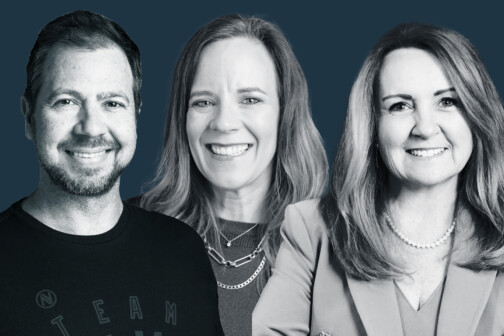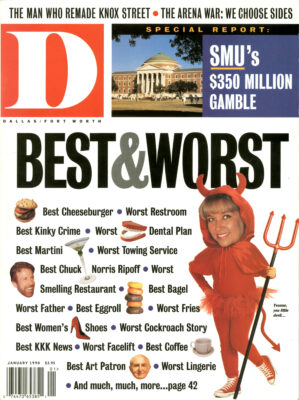DRIVING AROUND DALLAS’ TELECOM Corridor these days, it’s hard to find even a hint of ill foreboding. The area both east and west of Central Expressway, home to the world’s largest concentration of telecommunications industry activity, has an aura of the land rush-1990s style. Nortel, the giant Canadian-based equipment-maker formerly known as Northern Telecom, can’t seem to put up buildings fast enough to meet the needs of its expanding businesses. Last year, the company ran out of office space and asked some employees to work from home. The Dallas-Fort Worth operations of Ericsson, MCI, Nokia, and Fujitsu have experienced similar growth. While their counterparts in traditional industries fret over quarterly sales targets, executives in the high-flying telecom business worry about attracting enough qualified engineers, technicians, and managers to fuel a boom they anticipate will last for decades.
Dallas/Fort Worth sits at the epicenter of a global revolution in communications and information, an earthquake caused by deregulation, rapid technological change, and surging demand for communications equipment and services.
Since 1978, when Nortel acquired Richardson-based Dan Ray-one of the first companies outside the AT&T monopoly to make electronic switches, devices thai route phone calls-major telecom firms have flocked to Dallas, in turn attracting droves of skilled engineers and scientists to the region. The result: tens of thousands of high-quality jobs, record-low unemployment, and the diversification of an economy once dependent on energy and banking. According to a study by the Center for Economic Development and Research at the University of North Texas, information-communications industries employed 165,000 people at the end of 1995, an increase of 14 percent from late 1990, and generated a yearly economic impact of $22.9 billion.
But business history is littered with tales of industries that grew complacent and cities that relied too heavily on one industry or its large players. Detroit thrived during the auto boom of the 1950s and ’60s, only to see its economy shatter in the ’70s and ’80s as GM, Ford, and Chrysler closed plants. Los Angeles suffered greatly during the defense cutbacks of the late ’80s and early ’90s. Even Northern California’s Silicon Valley, the granddaddy of American high-technology, has seen periodic downturns.
While the horizon for the area’s new technology-based economy looks cloudless today, the local telecommunications industry has some shortcomings that could crimp growth in the future. Prominent among them: a shortage of entrepreneurs. It has not yet produced a class of high-powered start-up companies to rival those in the nation’s other leading technology centers: Silicon Valley and Boston’s Route 128. Nor has it had much success luring such ventures from elsewhere around the country.
That situation confounds local industry veterans like Tom Aschenbrenner. He joined Bell Labs in the early 70s, when a series of events had begun to loosen Ma Bell’s choke hold on the market for phone service and equipment. Aschenbren-ner jumped to Dan Ray, which grew from six to 850 employees before the Nortel acquisition.
“We ought to have start-ups coming out of our ears. The fact is, we don’t yet,” says Aschenbrenner, who has acted as a financial “angel,” providing seed money and advice to new ventures since selling his Intecomm stake in 1984.
“One of my missions in life…is to talk to young engineers and young marketing and salespeople and say ’look, it’s OK to take a risk, it’s OK to come up with an idea and do a start-up. What’s the worst thai can happen? If you fall flat on your face, you can always go back to get a job just like you’ve got right now.’That attitude is prevalent in the Silicon Valley. Maybe it’s in the water. But it’s not as prevalent in the Dallas-Fort Worth area.”
There are compelling reasons why entreprenuers should step forward now, says Dr. Robert Sullivan, director of the IC2 Institute in Austin, an arm of UT Austin that serves as an “incubator” for fledgling high-tech ventures.
“Real job growth over the next decade and beyond is going to come from startups and the small companies,” says Sullivan, a former dean of Carnegie-Mellon University’s business school. “You want to be in a position to have (hem forming in your community. This will be how the Dallas area keeps on reinventing itself.”
In addition to providing jobs and sometimes creating tremendous wealth for employees and shareholders, successful entrepreneurial ventures tend to be the firms that push American technology forward. Small firms, driven by visionaries with hot new ideas and desire for profit, tend to be the risk-takers, finding new markets and market niches faster than the big players. Consider the personal computer industry: It took start-ups like Compaq and Dell to trump giant IBM and make the desktop computer ubiquitous. More recently, a nimble California firm called Netscape invented the Internet browser, putting the world online and forcing Microsoft into a rearguard action to protect its dominance of the software industry.
But as Sullivan points out, starting a high-tech company is inherently risky. The rapid, global flow of scientific and technical information means that today’s stunning development can quickly become old hat. Most tech entrepreneurs do not succeed. “It’s almost a depressing figure,” Sullivan says. “Up to 80 percent fail after a period of time.”
So where do these risk-takers come from? In some areas of technology, notably the Internet, twentysomethings with freshly minted degrees pioneer an industry. But more often, the founders of successful start-ups are industry veterans with management and technical experience, with connections and access to capital. Thus far, few of Dallas’ telecom executives and engineers have turned to entrepreneurship.
Vibrant entrepreneurship isn’t happening for a number of reasons. For one, Telecom Corridor’s big firms are on the upswing. With salaries rising, layoffs almost unheard of, and the new technology frontier wide open, there is little reason to leave. “The people here are strongly tied to their corporate roots,” says Albert DeLorenzi, vice president for technology at Nortel. “A lot of them are enjoying successful careers within their corporations and are dedicated to that. Once some of the locally hired people progress in the executive ranks, they would be the first to see [entrepreneur-ship] as an opportunity.”
Berry Cash, a Dallas-based investor and former Texas Instruments executive, blames the culture of the telecom industry, which was heavily regulated and bureaucratic until the 1984 breakup of AT&T. “Professionals in the telecom world are more risk-averse than computer or semiconductor people,” Cash says. “It’s been a way of life in the computer industry.” That industry, he notes, has undergone “seismic” shifts in technology each decade since the mainframe dominated in the ’50s-minicomputers in the ’60s, the personal computer in the ’70s, networks in the ’80s, and the Internet today. “At each of these shifts in focus, there have been great opportunities to start new companies and new industries.”
Such a change is now occurring in telecommunications. Calls that now travel on copper wire increasingly will zip down high-capacity glass fiber; they will carry more digital data-from bank records to the latest video-than voice calls. Cell phones have become a mass consumer item, spurring a need for antennas and systems providing clearer service and ways to deliver information. Internet users want modems that send web pages cascading onto computer screens instead of dripping out like Heinz ketchup. This transformation, in tandem with a deregulation process that gained momentum with the 1996 federal Telecommunications Reform Act, has created a tremendous market for new software, hardware, and services. The big companies can’t provide all of this stuff, and they’re looking for entrepreneurs to fill in the gaps.
“Whenever you get a discontinuity in an industry, like this tremendous deregulation and the advent of all these new services, it’s opportunity,” says Ben Scott, chief executive of PrimeCo Personal Communications, a Southlake-based company specializing in digital cellular phone service. “When you get astute businesspeople who take advantage of it, suddenly you end up with people like Steve Jobs and Bill Gates.”
That’s one reason why venture capitalists, investment bankers, and other interested parties are paying closer attention to Dallas/Foil Worth. In September, Texas Instruments announced the formation of a $100 million fund to invest in small companies pushing the envelope in “digital signal processing,” such as ways to send data 10 cell phones. So far, TI Ventures has invested in eight companies. Alan Katz, director of corporate development, says :he fund has received proposals from local start-ups but none from experienced businesspeople.
“That’s just starting to build now,” Katz says. In Silicon Valley and Boston, “you have management where people have done it before. It’s going to take some lime here in Dallas.”
Is this a bad place to be a technology entrepreneur? Certainly not. With a deep talent pool of technical talent, cheap real estate, low ta\es, and minimal government interference, it is in fact one of the best small-business cities in the nation. But Dallas has focused on luring big corporations; it’s done little to create conditions conducive to high-tech start-ups.
According to experts like Sullivan, such firms need a great deal of support in order to flourish. They need access to cap-ital, business services, and advice. That requires coordination and the pooling of resources between universities, the business community, and municipalities.
“Dallas has a lot of the basic elements necessary for being a national model for technology and innovation in start-ups,” says Sullivan. “But nobody is stepping out and saying., ’As a community, we’re going to make the greater Dallas area one of the most friendly and encouraging places in the world for the tech entrepreneur.’ It simply doesn’t have that identity now.”
Austin does A decade ago, the University of Texas, city officials, and business leaders set out to make the capital a high-tech haven. Oie of the results was IC2, an “incubator’ for technology small fry. There, entrepreneurs can get advice on their business plans and access to low-cost or pro beno legal, tax, and human resources services, which can be crucial early on. More importantly, they can get plugged in to financing networks. Another important Austin institution is The Capital Network, a nonprofit that matches investors with start-up companies. Recently, the organization put on a well-attended conference in Dallas.
“It’s not a zero sum game where Austin wins and Dallas loses,” says David Gerhardt, the Network’s executive director. “We have branches of companies, banks, and law and accounting firms in both places. We see a lot of Dallas investors coming here looking for deals. The Austin companies go up there.”
One promising recent development is Startech, a technology incubator that will be based in Richardson, Once in full operation, it will host between 15 and 25 startups at a time, offering services like those available at IC2 and access to capital through an envisioned multimillion-dollar “Startech Seed Fund.”
Unlike IC2, private business provided the impetus for Startech. DSC Communications, Fujitsu, Nortel, Ericsson, and other companies, along with local law and accounting firms, are among an expected 25 “stakeholders” that will finance the incubator and the fund.
Terry Rock, principle in the Dallas venture capital firm Center Point Venture Partners, says he and the other founders of Startech wanted to send a clear signal of support to would-be entrepreneurs.
“In the [Silicon Valley 1, it’s cool to be an entrepreneur,” says Rock, former head of Convex Computer. “In Richardson, it’s a lot cooler to be an engineer in a big company. But there are a lot of people who have me impetus and the desire to start a company. We want to make sure they have the license to do that.”
Another element lacking in the local high-tech start-up scene is a network to deliver financing to tech start-ups, a way to link risk-taking entrepreneurs with people who want to risk their money. Due to the booming U.S. economy and stock market, big institutional investors like pension funds are flush with cash. Venture investment hit a record high of $9.53 billion in 1996. and $5.51 billion went into new companies in the first half of 1997, according to accounting and consulting firm Price Waterhouse. Texas start-ups have received 6 to 7 percent of such funding over the past two years.
But entrepreneurs without prior experience and ties to financiers aren’t likely to get a foot in the door. Most local fortunes were made in industries such as banking, real estate, and energy. The people behind that wealth don’t generally take risks on high-tech because “they don’t understand all the nuances of the technology business,” says Mike Wil-kenson, founder of Paragon Innovations, a small company in Richardson that develops computer chips and other devices for MCI. Motorola, and others.
So where does a first-time entrepreneur, fresh from his garage lab, get the $75,000 to $200,000 the average start-up needs to get off the ground? Some test the limits of their Visa cards or take a second mortgage. Many rely on friends, relatives, and co-workers, says Jerry White. director of the Caruth Institute of Owner-Managed Business at SMU’s Cox School.
“If you can take that amount of capital and do something impressive with it- you made deliveries on time, you talked some substantial customers into yearlong contracts-then further investors will see the merit and you’re going to find it easier to attract a half or three-quarters of a million.”
Another way is to find an “angel,” a successful entrepreneur in the same industry who’s been through it all before and will help with money, advice, and business connections. Dallas has yet to produce a significant cadre of such people, whose function as role model is often as important as their money.
That’s starting to change, however.
The Southwest Venture Forum, started by SMU’s White a few years ago, convenes every two months at the Westin Galleria Hotel. New ventures give presentations at its early morning meetings, but more importantly, the forum provides a chance for entrepreneurs and investors to rub elbows. Frank Wagner, 29, and Eric Foster, 30, co-founders of a year-old company called Watch Me, made contacts at the forum that led to financing. Watch Me, hatched in a class while the two were earning MB As at SMU, allows parents to keep tabs on children at day care centers via the Internet. The pair is in the process of putting together$l million in expansion capital that will allow them to market the system nationally.
Can success stories like this be replicated, creating a local entrepreneurial hotbed to rival those of the East and West coasts and sow the seeds for its high-tech future? Many are confident, but some say it’s too early to start making such lofty comparisons.
“What you see in Boston and Silicon Valley is an infrastructure that has developed over many, many years,” says White. “These are the two premier technology places on the planet. When I look at Dallas, I see plenty of technology managers and investors. It’s going to be a serious player. The boiling pot of industry is going to make this a very fertile ground for high-tech entrepreneurship in the future.”
Related Articles

Hockey
What We Saw, What It Felt Like: Stars-Golden Knights, Game 1
Deja vu all over again. Kind of.
By Sean Shapiro and David Castillo

Movies
A Rollicking DIFF Preview With James Faust
With more than 140 films to talk about, of course this podcast started with talk about cats and bad backs and Texas Tech.
By Matt Goodman

Business
New CEOs Appointed at Texas Women’s Foundation and Dallas Area Habitat for Humanity
Plus: Former OpTic Gaming CEO Adam Rymer finds new e-sports post, Lynn Pinker Hurst & Schwegmann hires former Mary Kay chief legal officer, and more.
By Celie Price and Layten Praytor


